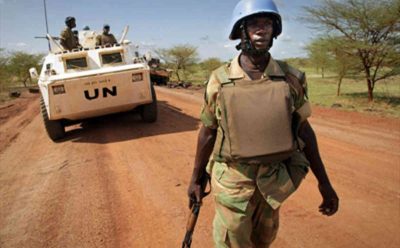By
Sylvain Muyali
Despite calls from the Democratic Republic of the Congo for greater numbers to be withdrawn, the fifteen member United Nations Security Council adopted a resolution for 2000 troops to be cut from the 20,000 strong UN MONUSCO peacekeeping force.
The vote came after Congolese Foreign Minister Raymond Tshibanda told the Security Council it was time for Kinshasa to take “full responsibility for its security” following sixteen years of UN troop presence in the DRC.
The country’s President Joseph Kabila had previously sought an immediate cut of 6,000 troops and a clear commitment to shut down MONUSCO’s operations as soon as possible.
Tensions had been rife between Kinshasa and the UN over how to deal with rebel groups in the east and security concerns ahead of the elections seen as a test of democracy in the DRC.
The resolution drafted by France endorsed a recommendation from UN Secretary General Ban Ki-moon who said the reduction would not affect the security situation.
MONUSCO’s mandate has now been renewed until March 2016, keeping in place an ‘intervention brigade’ comprising of troops from South Africa, Tanzania and Malawi.
However, the resolution also opened the door to talks on winding down the UN mission, stating that “MONUSCO’s exit should be gradual and progressive, tied to specific targets” established by Kinshasa and the United Nations.
MONUSCO has in recent years pushed for the disarming of dozens of rebel groups in the volatile east, most recently the Democratic Forces for the Liberation of Rwanda, FDLR, Hutu militia.
After months of planning with the UN mission for a joint offensive, Congo’s military in January announced a unilateral offensive against the FDLR rebels.
That move followed a dispute over the appointment of two Congolese generals to lead the offensive who were on a UN blacklist of human rights violators.
The UN mission withdrew its support to the offensive against the FDLR after Kinshasa refused to sack the two generals.
The troop reduction did not affect the UN-mandated ceiling of about 21,000 forces, which suggested that the Security Council could decide at a later time to again boost UN troop presence in the DR Congo.
The cut will become permanent once significant progress has been achieved regarding the priorities of the UN peacekeeping organisation’s mandate, including the ongoing fight against FDLR rebel forces.
Congolese Ambassador Ignace Gata Mavita told the council his government “took note” of the troop reduction and was ready to “engage in a deep reflection” on the future of the UN presence in the DR Congo.



No Comments Yet!
You can be first to comment this post!